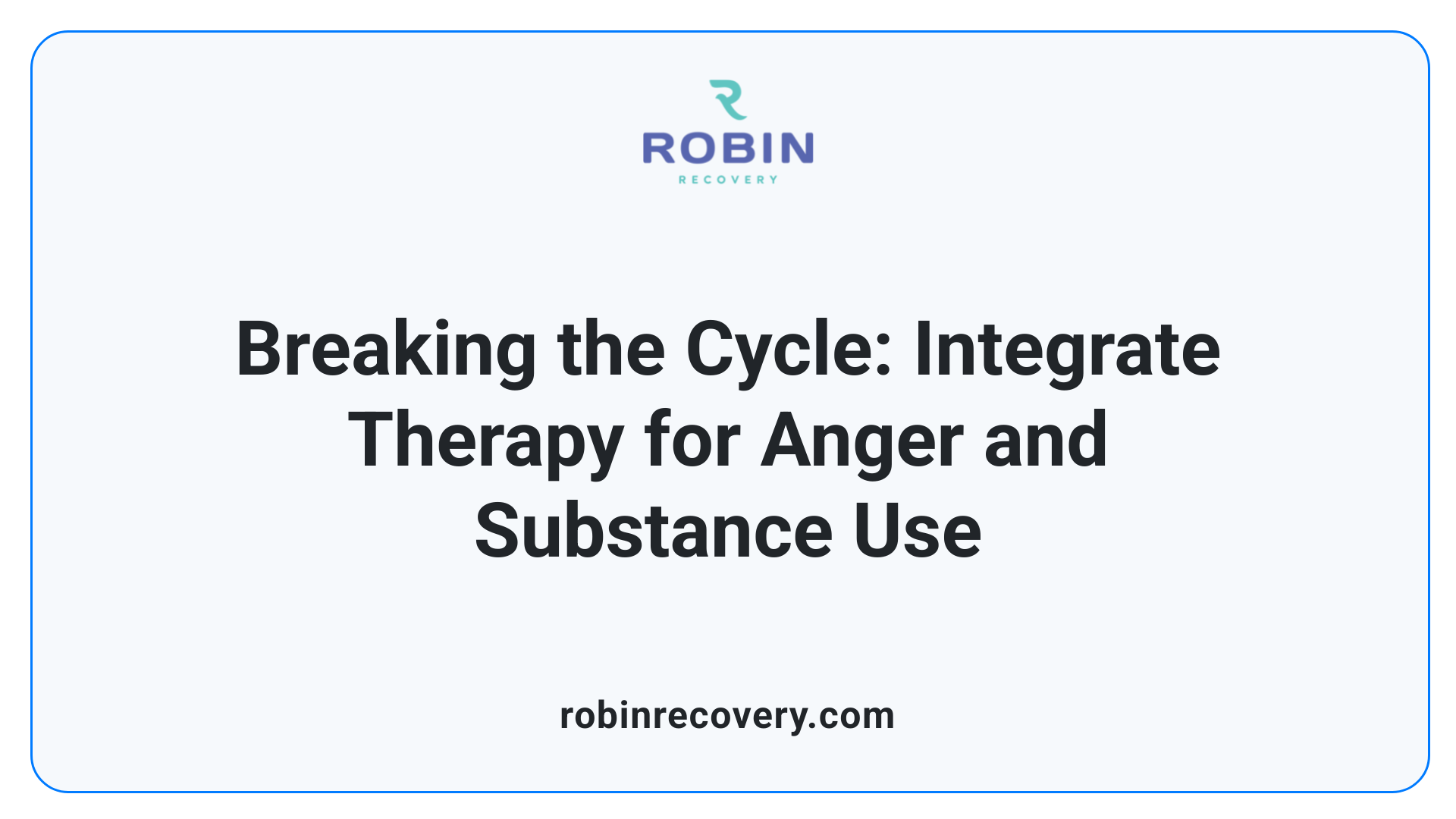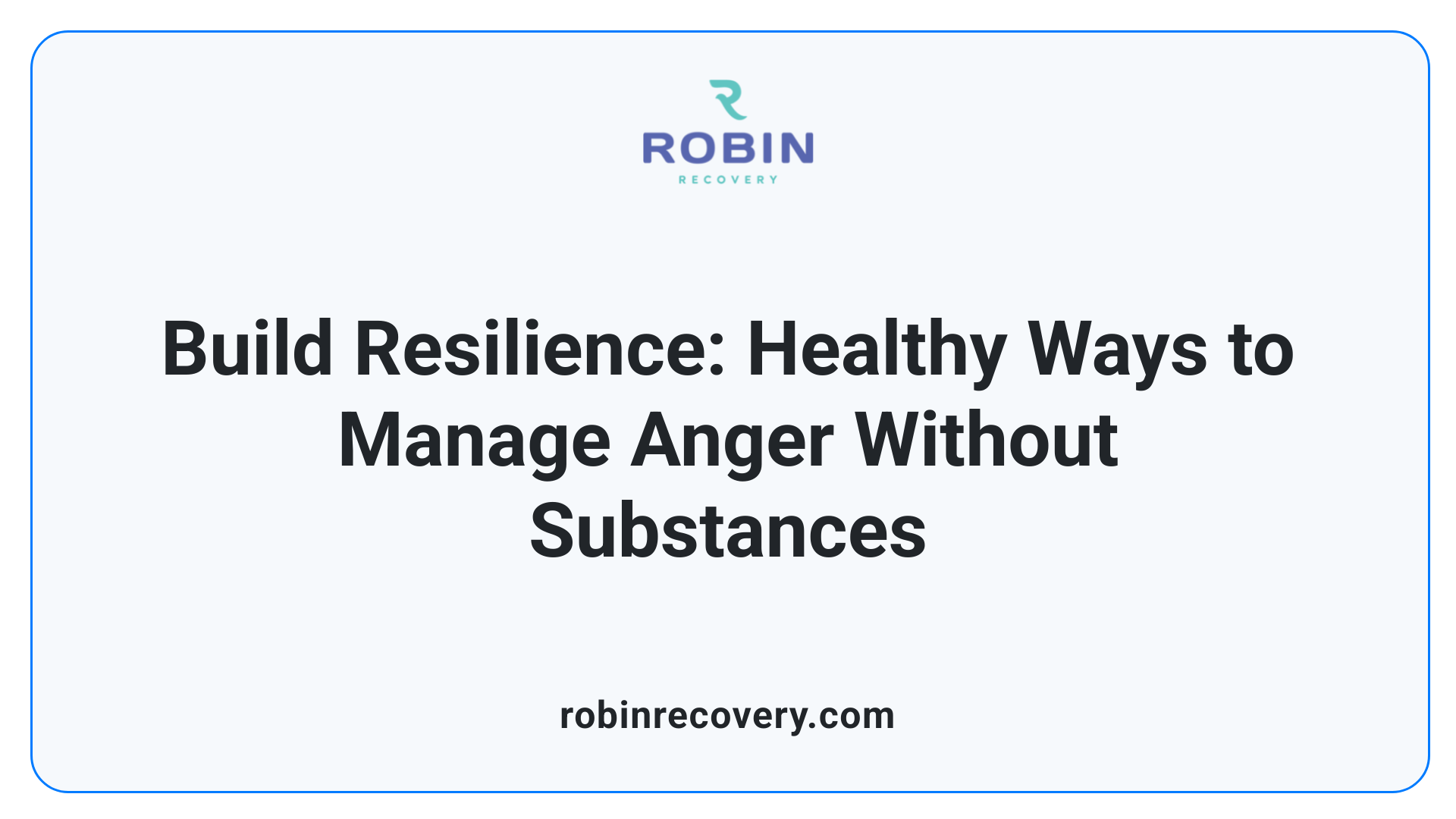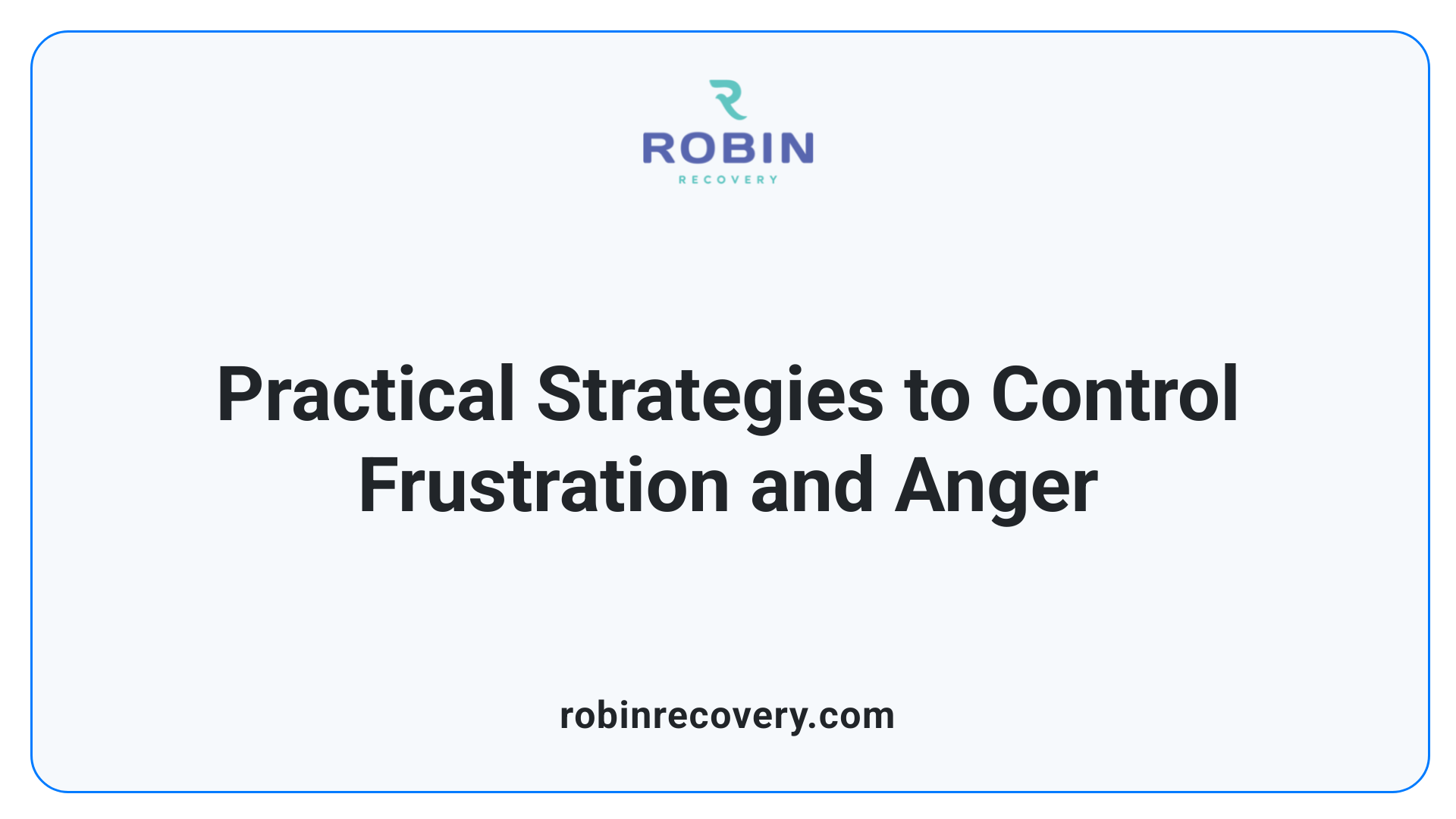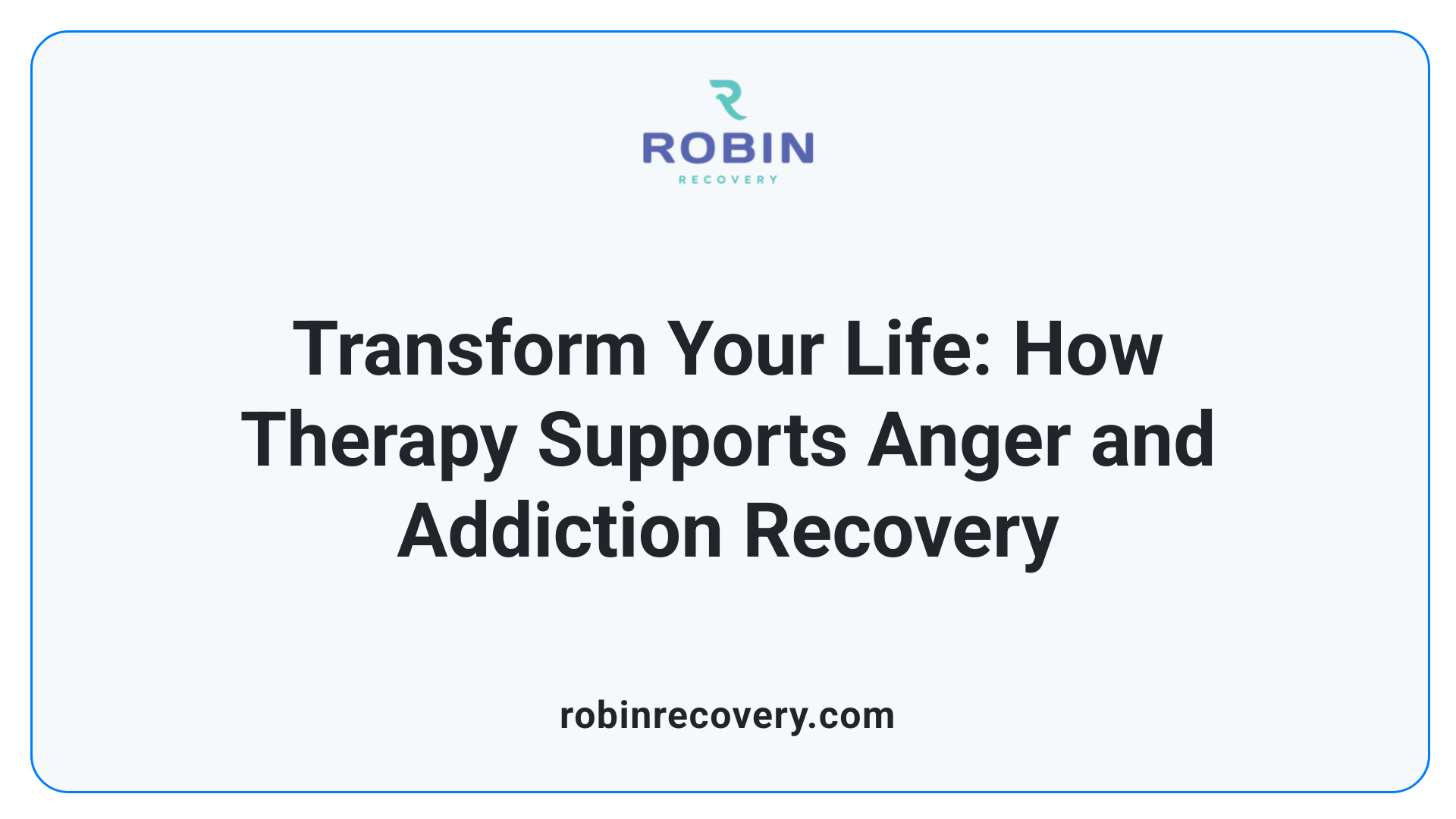Understanding the Importance of Managing Anger Without Substances
Anger is a natural human emotion that, when managed properly, can serve as a healthy response to environmental stressors. However, poor anger management can lead to serious consequences including relationship breakdowns, health issues, and increased risk of substance abuse. Many individuals turn to substances to cope with their anger or emotional distress, which creates a cycle that reinforces both anger and addiction. Recognizing the connection between anger and substance use underscores the importance of developing effective, healthy coping mechanisms for emotional regulation.
The Link Between Anger and Substance Use

What is the connection between anger and addiction?
Anger and addiction are closely linked through both biological and behavioral pathways. When individuals experience anger, their brain's stress response is activated, releasing hormones like cortisol and adrenaline. Some people seek the rush of endorphins released during angry outbursts, which can temporarily soothe emotional distress. Over time, this pursuit of relief can lead to substance use as a form of self-medication.
Poor anger management increases the risk of turning to drugs or alcohol to calm or escape from intense feelings. This cycle can reinforce both anger issues and substance dependency, creating a challenging situation to break free from. Trauma and exposure to violence—such as domestic abuse, bullying, or childhood neglect—further heighten vulnerability. These emotional wounds contribute to impulsive, aggressive behaviors and increase the likelihood of turning to substances.
Chemicals like alcohol and stimulants can heighten feelings of anger, blurring the line between emotional regulation and impulsivity. Alternatively, some individuals use substances to temporarily soothe or numb the emotional pain associated with unresolved anger, which can escalate into a cycle of addiction and aggression.
Effective treatment must target both issues simultaneously. Therapy approaches, such as cognitive-behavioral therapy, help individuals develop healthier coping strategies. Incorporating anger management techniques and substance use treatment provides a holistic approach to breaking this interconnected cycle. Support systems, including counseling, peer groups, and harm reduction resources, play a vital role in recovery.
More info
For more on this topic, search using terms like "anger and addiction link Canada" to find localized resources and specialized programs addressing both issues.
Developing Healthy Coping Strategies for Anger

How can I develop healthy coping mechanisms for managing anger without substances?
Managing anger without turning to substances requires adopting constructive and calming practices. One effective approach is practicing mindfulness and relaxation techniques. Deep breathing exercises, meditation, and progressive muscle relaxation help calm the nervous system and reduce tension.
Physical activities like sports, walking, or workouts are also powerful outlets for releasing stress and frustration. Regular exercise stimulates the release of endorphins, which naturally improve mood and promote relaxation.
Engaging in creative outlets such as journaling, painting, music, or writing allows you to express your emotions safely and productively. These activities can serve as a vent for anger and help clarify your feelings.
Seeking emotional support is crucial. Talking to trusted loved ones, friends, or mental health professionals provides a safe space to discuss your feelings. Support from professionals trained in culturally sensitive and affirming care is especially important for ensuring effective and respectful guidance.
There are also many resources available to help you manage anger. Helplines like SAMHSA’s National Helpline (1-800-662-HELP) connect callers with local support services, treatment options, and additional resources.
Implementing these strategies can help you develop healthier ways of coping, ultimately reducing the reliance on substances and supporting long-term emotional well-being.
Techniques for Managing Anger Effectively

What techniques can help manage frustration and anger effectively?
Managing anger involves several practical strategies that can prevent escalation and promote emotional well-being. Developing self-awareness is the first step; recognizing warning signs such as clenched fists, tense muscles, racing heartbeat, or headaches can help you intervene early.
Journaling about anger triggers and responses helps in identifying personal patterns. Once aware, grounding techniques like focusing on your breath, counting to ten, or holding a grounding object can calm intense emotions.
Physical activities such as walking, jogging, or sports help release pent-up tension and boost mood through endorphin release. Creative outlets like painting or music can also serve as constructive ways to express feelings.
Effective communication skills are essential. Using assertive language to express concerns calmly and clearly can prevent misunderstandings and reduce hostility.
Visualization and grounding exercises—such as imagining a peaceful scene or concentrating on sensory details—can redirect focus away from anger triggers.
If anger becomes difficult to control or leads to harmful actions, seeking professional help through counseling or anger management programs is crucial. These interventions provide tools for long-term emotional regulation and healthier relationships.
The Role of Therapy and Professional Help

How can therapy help in managing anger without substances?
Therapy plays a vital role in helping individuals control their anger, especially those struggling with addiction or emotional regulation issues. Talk therapy, particularly cognitive behavioral therapy (CBT), helps individuals identify their anger triggers and recognize early warning signs. Through CBT, they learn relaxation techniques, such as deep breathing and progressive muscle relaxation, and develop new thinking patterns that promote healthier responses.
Medications can also support anger management, especially in severe cases like Intermittent Explosive Disorder (IED). Drugs such as selective serotonin reuptake inhibitors (SSRIs), anticonvulsant mood stabilizers, or other prescribed medicines are often integrated into comprehensive treatment plans. These medications help regulate mood and impulsivity, reducing the frequency and intensity of explosive anger episodes.
Creating tailored anger management strategies, including safety plans to prevent domestic violence, is essential. Safety plans may involve steps like contacting hotlines, locking firearms away, and establishing clear signals with trusted neighbors or authorities for emergencies.
Both individual and group therapy offer participants a safe space to explore their anger issues, learn constructive coping skills, and gain support from others facing similar challenges. Regular therapy sessions enhance emotional awareness and resilience, helping individuals manage their feelings effectively without resorting to substances.
Addressing Underlying Issues and Diagnoses
How does mental health influence anger management?
Mental health and anger are closely linked; when mental health issues are present, managing anger becomes more challenging. Poor mental health can trigger or worsen emotional responses, leading to destructive behaviors or substance use as a coping mechanism.
Proper assessment is vital to identify the root causes of anger. Doctors often conduct physical exams and mental health evaluations to understand whether conditions like Intermittent Explosive Disorder (IED) contribute to explosive anger episodes. IED manifests in impulsive, severe rage that occurs without clear provocation and is common among young males.
Understanding whether mental health, neurological factors, or environmental stressors influence anger enables personalized treatment plans. These may include medications such as selective serotonin reuptake inhibitors (SSRIs) or anticonvulsants to help stabilize mood and reduce impulsivity.
In addition to medication, therapy plays a crucial role. Cognitive behavioral therapy (CBT) and other counseling methods help individuals identify anger triggers, develop coping skills, and alter destructive thought patterns.
Addressing underlying mental health conditions not only diminishes the frequency and intensity of anger outbursts but also promotes emotional resilience. This holistic approach reduces the risk of anger-driven behaviors leading to substance abuse, fostering long-term well-being and stability.
For more information, interested individuals can search using terms like "mental health and anger management Canada" to find local resources and support services.
Creating a Supportive Environment and Building Skills
How can developing a personal anger control plan help manage emotions?
Creating a personal anger control plan is an effective way to manage emotions before they escalate into harmful behavior. It involves identifying specific triggers and early warning signs—like clenched fists, a racing heart, or tense muscles—that signal rising anger. By recognizing these cues early, individuals can take proactive steps to calm down. Tools such as the anger meter, which rates anger levels from 1 to 10, help track progress and indicate when to implement calming strategies. Developing this plan also includes practicing relaxation techniques, such as deep breathing and progressive muscle relaxation, which activate the body's relaxation response.
Why is recognizing early warning signs important?
Early detection of signs like jaw clenching, racing thoughts, or tension allows individuals to intervene before anger becomes unmanageable. Knowing these signs helps prevent situations from escalating into violence or verbal abuse. When early signs are acknowledged, people can choose to step away, engage in calming activities, or use specific coping skills learned in therapy.
How does building social support support anger management?
Strong social networks offer encouragement, accountability, and emotional support. Friends, family, or support groups provide safe outlets for expressing feelings and gaining perspectives. Sharing feelings with trusted individuals can validate emotions and reduce frustration, which helps prevent bottled-up anger from erupting unexpectedly.
What are effective conflict resolution and assertiveness techniques?
Practicing conflict resolution skills—such as using 'I' statements to express concerns calmly—can defuse tense situations. Assertiveness involves communicating needs and boundaries clearly without aggression. For example, calmly discussing a disagreement instead of shouting or slamming doors fosters healthier interactions. Role-playing or attending anger management courses can strengthen these skills.
How do these strategies contribute to long-term emotional resilience?
Combining these methods leads to better emotional regulation, reducing the likelihood of substance use as a coping mechanism. With consistent practice and support, individuals can build resilience, improve relationships, and maintain sobriety. Incorporating professional help when needed further enhances these efforts, ensuring a comprehensive approach to managing anger and emotions.
Long-Term Commitment to Emotional Wellness and Recovery
How can I sustain anger management and emotional regulation over time?
Maintaining emotional wellness and managing anger over the long term is an ongoing process that requires dedication and patience. It’s normal to face ups and downs, so celebrating small victories along the way can motivate continued progress. Recognizing and acknowledging your improvements helps reinforce positive habits.
In addition to self-awareness, seeking ongoing support from mental health professionals, support groups, or trusted loved ones plays a vital role. Regular therapy sessions or participation in anger management courses provide new strategies and accountability to stay on track.
Core principles like acceptance, surrender to a higher power, and honesty serve as the foundation for lasting change. These values promote a compassionate approach to oneself, embracing imperfections and ongoing growth.
Building resilience involves cultivating healthier habits such as consistent exercise, mindfulness practices, and self-care routines. These activities strengthen emotional regulation and reduce the likelihood of relapse into negative patterns.
Understanding that setbacks are part of the recovery process helps foster patience and kindness towards oneself. Maintaining a long-term perspective, combined with unwavering commitment and support, can significantly improve emotional health and aid in managing anger effectively over time.
Empowering Yourself Through Knowledge and Support
Managing anger without substances is an achievable goal that promotes emotional well-being and healthier relationships. It involves understanding the connection between anger and addiction, developing tailored coping strategies, seeking professional help when necessary, and building a supportive environment. Consistent practice of relaxation techniques, assertive communication, and self-awareness fosters resilience and long-term emotional regulation. Remember that recovery is a journey, and patience, persistence, and support are key to maintaining control over your emotions and living a substance-free life.
References
- Get help with substance use - Canada.ca
- Addiction and Anger Management
- Anger management: 10 tips to tame your temper - Mayo Clinic
- Ten Ways To Cope Without Drugs or Alcohol
- Intermittent explosive disorder - Diagnosis and treatment - Mayo Clinic
- Anger Management for Addiction
- Managing Your Feelings Without Substances - SMART Recovery

.svg)

.svg)

.svg)
.svg)








































































































